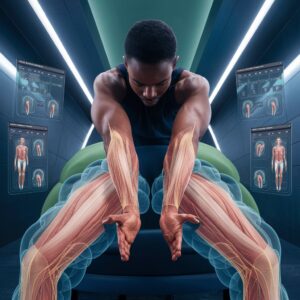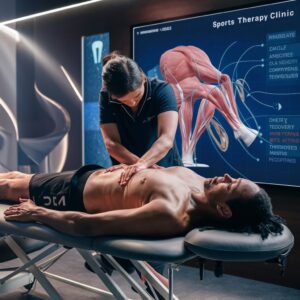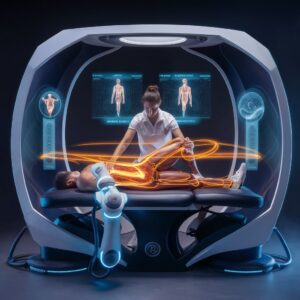Choosing the Right Massage: Sports vs Deep Tissue
Massage therapy encompasses various techniques and methods to address individual needs and objectives. By understanding the distinctions between sports massage and deep tissue massage, individuals can take charge of their massage therapy decisions. Sports massage, a specialised form of massage therapy, can be valuable for individuals who engage in physical activities and maintain an active routine.
We aim to minimise and treat sports-related injuries, improve flexibility, and maximise athletic performance. This massage technique combines stretching, compression, and friction to focus on specific muscle areas and speed up recovery. Deep tissue massage is a therapeutic technique that targets the deepest layers of connective tissue and muscles.
This is particularly beneficial for individuals experiencing ongoing discomfort, muscle tension, and issues with their posture. Deep tissue massage is known for its powerful pressure and precise strokes, providing a soothing and relieving experience by targeting muscle tension and adhesions. This technique effectively reduces pain and improves mobility. However, sports massage is tailored to enhance performance and prevent injuries, catering to athletes and individuals who lead active lifestyles.
Deep tissue massage effectively addresses chronic pain and muscle tightness by targeting the deeper layers of muscles and connective tissues.
Main Pointers
- Experience the benefits of sports massage for enhanced athletic performance and injury prevention, or indulge in the therapeutic effects of deep tissue massage to alleviate chronic pain and muscle tension.
- Active individuals can greatly benefit from sports massage, as it can help improve performance, reduce the risk of injuries, and speed up recovery.
- Deep tissue massage relieves individuals with chronic pain, muscle tension, and limited mobility.
- Customising your massage to suit your requirements entails effective communication with your therapist regarding your objectives and any specific areas requiring attention.
- The benefits of sports massage are that it enhances athletic performance and expedites post-workout recovery. Experience increased flexibility, reduced muscle soreness, and deep relaxation.
 When to Choose Sports Massage for Active Individuals
When to Choose Sports Massage for Active Individuals
Maximising Efficiency
Massage can assist athletes in priming their muscles for peak performance prior to a sports competition or rigorous workout. Some of the benefits that can be achieved are improving flexibility, enhancing range of motion, and reducing the risk of injuries during physical activity.
Speeding up the process of recovery
Following a rigorous workout or sports event, a sports massage can assist in recovery by alleviating muscle soreness, enhancing circulation, and expediting the removal of metabolic waste from the body.
Ensuring Safety and Facilitating Recovery
Regular sports massage treatments are highly effective in identifying and addressing potential areas of muscle stiffness, imbalance, or overuse, significantly reducing the likelihood of sports-related injuries. For athletes recovering from an injury, sports massage plays a crucial role in promoting healing, restoring mobility, and preventing muscle wasting. Incorporating sports massage into a comprehensive training routine can benefit physically active individuals. It can enhance performance, prevent injuries, and aid healing.
The Benefits of Deep Tissue Massage for Chronic Pain and Muscle Tension
Deep tissue massage offers a multitude of benefits for individuals dealing with chronic pain, muscle tension, and postural issues. This therapy specifically targets the deep layers of ligaments and tendons to relieve stress, alleviate discomfort, and improve overall mobility. Deep tissue massage offers numerous benefits for alleviating persistent pain and muscle tightness:
Relief from Pain: Deep tissue massage effectively reduces chronic pain conditions such as lower back pain, tension in the neck and shoulders, fibromyalgia, and osteoarthritis. Applying firm pressure during the massage helps break up adhesions and knots in the muscles, reducing pain and discomfort.
Enhancing range of motion is just one of the numerous advantages that deep tissue massage offers. It effectively relieves chronic muscle stress and stiffness, improving posture, mobility, and flexibility. Individuals who experience stiffness or limited movement due to prolonged periods of inactivity, repetitive actions, or injuries may find this to be a valuable resource.
Reducing Stress: Dealing with chronic pain and muscle strain often increases stress levels and mental fatigue. Experience the incredible benefits of deep tissue massage. This treatment relieves physical discomfort, promotes deep relaxation, reduces stress hormones, and enhances overall well-being.
Deep tissue massage is highly effective for addressing chronic pain and muscle tension. It emphasises the root cause of distress and promotes long-term relief. This approach is advantageous for individuals recovering from sports injuries, accidents, or surgical procedures. Rehabilitation is enhanced through the improvement of circulation, reduction of scar tissue formation, and restoration of normal function to the affected muscles and soft tissues.
Tailoring Your Massage to Your Specific Needs
When choosing between sports massage and deep tissue massage, it's essential to tailor your decision to meet your specific needs and goals. Each type of massage therapy offers unique benefits that cater to particular conditions and lifestyles. When determining the massage that best suits your needs, there are several factors to take into account:
Sports massage may be the perfect solution if you lead an active lifestyle, such as being an athlete or engaging in physically demanding work. This massage is designed to enhance your training routine and minimise the likelihood of sports-related injuries. On the other hand, if you experience ongoing discomfort or muscle tension unrelated to physical exertion, deep-tissue massage may be a better option for addressing your specific needs.
Effective Pain Relief: Deep tissue massage can be a powerful treatment option for chronic pain disorders like fibromyalgia, arthritis, or muscular tension. By focusing on the underlying causes of discomfort, it offers a more targeted and effective approach to pain management. Sports massage can also help relieve acute muscle discomfort, but its primary goal is to enhance sports performance—the ultimate aim.
Factors to Consider: Consider your ability to manage stress and overall satisfaction with different massage techniques. Regarding sports massage, you can expect stimulating movements and stretching techniques. On the other hand, deep tissue massage focuses on applying firm pressure to reach those more profound layers of muscle. Ensure clear communication with your massage therapist to ensure a personalised experience.
When it comes to enhancing athletic performance, aiding in injury recovery, relieving chronic pain, inducing relaxation, and aligning your treatment goals with the specific benefits that sports or deep tissue massage can provide, seeking guidance from an experienced massage therapist can assist in identifying the most suitable approach for your particular needs and preferences.
 How Sports Massage Can Improve Athletic Performance and Recovery
How Sports Massage Can Improve Athletic Performance and Recovery
Having a sports massage can significantly enhance sports performance and assist in the recovery process for athletes of all levels of expertise. For individuals of all athletic levels, incorporating sports massage into your training regimen can offer numerous benefits for your physical well-being. Discover various techniques that can optimise athletic performance and aid post-workout recovery.
Enhanced Flexibility: An essential element of sports massage involves stretching exercises to improve mobility and flexibility. This can particularly benefit individuals seeking optimal flexibility in their sport or activity.
By targeting specific muscle groups prone to overuse or tension, sports massage can help prevent injuries. This approach significantly minimises the chances of experiencing sports-related injuries, such as strains, sprains, and muscle imbalances. Regular sessions are essential for identifying potential areas of concern and implementing proactive measures to resolve them effectively.
Optimised Recovery: Sports massage is a highly effective tool for enhancing recovery. When recovering from intense exercise or competition, dealing with pain, inflammation, and exhaustion can be a real challenge. However, there is a solution that can help speed up the recovery process. Sports massage is known for its ability to eliminate metabolic waste, which in turn leads to a faster recovery time. Due to the focus on recovery, viewers may experience a sense of upliftment and optimism.
Improved Blood Flow: Sports massage is crucial in enhancing muscle circulation. This process ensures the delivery of essential oxygen and nutrients required for muscle rejuvenation and recovery. Enhanced blood circulation aids in the removal of metabolic waste products that contribute to muscle fatigue. The focus on enhanced circulation can leave the audience feeling refreshed and revitalised. In conclusion, sports massage offers numerous advantages for athletes, helping them improve their performance, prevent injuries, and speed up recovery following intense physical activity.
The Therapeutic Effects of Deep Tissue Massage for Stress and Anxiety
Managing Stress and Anxiety
Deep tissue massage offers numerous benefits for individuals struggling with stress and anxiety. Initially, the firm pressure activates the parasympathetic nervous system, prompting the body's relaxation response. This reduces stress hormones, promoting a sense of calmness and tranquillity.
Benefits that appeal to the emotions
Deep tissue massage can also help release emotional blockages stored in the muscles, providing a sense of emotional release and relief. Chronic muscle tension is commonly associated with emotional stress and psychological strain. By relieving this tension, individuals can enhance their emotional well-being.
Enhanced Overall Health and happiness
Not only does deep-tissue massage help alleviate stress and anxiety, but it also promotes better sleep by relieving tension in the body and inducing a sense of calm in the mind. This comprehensive approach can result in heightened self-awareness and a greater understanding of equilibrium. Through deep tissue massage, individuals can achieve heightened harmony between their body and mind. This therapeutic technique helps to alleviate physical tension, leading to relaxation, decreased stress hormones, and improved emotional well-being.
 Finding the Right Balance: Incorporating Both Sports and Deep Tissue Massage into Your Wellness Routine
Finding the Right Balance: Incorporating Both Sports and Deep Tissue Massage into Your Wellness Routine
While sports and deep tissue massage serve distinct purposes in addressing physical needs and promoting overall well-being, combining these techniques in your wellness routine can offer a comprehensive approach to maintaining optimal health. By combining the benefits of sports massage to improve athletic performance with the therapeutic effects of deep tissue massage to reduce stress, individuals can achieve a balanced approach to their physical and mental well-being. Individuals who engage in regular physical activity or competitive sports can significantly enhance their training routine by incorporating sports massage. Implementing this approach can effectively reduce the risk of injuries, improve overall performance, and facilitate the process of recovery.
Regular deep-tissue massage treatments effectively address chronic pain disorders, reduce stress levels, and promote overall relaxation. You can integrate sports and deep-tissue massage into a customised wellness program by working with a skilled massage therapist who understands your unique needs and goals. By utilising this comprehensive approach, you can effectively manage persistent pain and reduce stress while prioritising your mental and emotional well-being and keeping up with the demands of your busy lifestyle.
In the end, having a clear understanding of the distinctions between sports and deep tissue massage allows individuals to decide which approach is most suitable for their specific requirements. Both types of massage, whether focused on enhancing athletic performance or alleviating persistent discomfort, offer distinct advantages that cater to particular needs and preferences. With the expertise of a seasoned professional, you can make informed decisions about the most suitable massage therapy for your specific requirements. This empowers you to take charge of your own health and overall wellness.
By tailoring your choice of massage therapy to suit your specific requirements and goals, you can achieve a balanced approach to holistic wellness that enhances your physical and emotional state.
FAQs
Could you please explain what sports massage entails?
Sports massage is a specialised form of massage designed to address injuries or conditions related to sports. This type of massage is not intended for relaxation and can be quite physically demanding.
Could you please explain the concept of deep tissue massage?
Deep tissue massage is a therapeutic technique that targets the deeper layers of muscles and connective tissue, helping to realign and alleviate tension. This service mainly benefits individuals experiencing chronic discomfort, including persistent aches, contracted areas such as a stiff neck and upper back, low back pain, tight leg muscles, and sore shoulders.
Could you please explain the distinctions between sports massage and deep tissue massage?
Sports massage caters to athletes of all levels, from elite competitors to casual runners. The details of the sports massage technique are tailored to the athlete's sport. Deep tissue massage focuses on reaching the deeper layers of your muscles, tendons, and fascia. This technique addresses persistent discomfort, including chronic aches, contracted areas like a stiff neck and upper back, low back pain, tight leg muscles, and sore shoulders.
What advantages does sports massage offer?
Sports massage is highly beneficial for athletes as it helps to keep the body in optimal condition, reduces the risk of injuries and maintains mobility. It also aids in the recovery of injured muscle tissue, enhances performance, and prolongs an athlete's sporting career.
What advantages does deep tissue massage offer?
Deep tissue massage is typically used to address specific issues, such as chronic muscle pain, injury recovery, and various conditions like low back pain, limited mobility, and postural problems. It can also be beneficial for addressing muscle tension in areas such as the hamstrings, glutes, IT band, legs, quadriceps, rhomboids, and upper back.
Which type of massage would be most suitable for me?
The best massage suits you will vary according to your requirements and objectives. Sports massage could be highly advantageous if you're an athlete seeking to enhance performance and minimise the risk of injuries. If you're dealing with persistent muscle pain or have specific areas that need attention, a deep-tissue massage might be the most suitable choice. For optimal results, seeking guidance from a skilled massage therapist is highly recommended to tailor the treatment to your specific requirements.
Brought To You By:
References
- The Role of Massage in Sports Performance and Rehabilitation: https://www.ncbi.nlm.nih.gov/pmc/articles/PMC2953308/
- What is a Sports Massage, and how is it of benefit https://www.physiotherapymatters.co.uk/blog/why-should-i-have-sports-massage/
The Article: Sports vs. Deep Tissue Massage: Making an Informed Decision appeared first on https://mcrtherapies.co.uk
The Article Sports or Deep Tissue Massage: Choose Wisely appeared first on https://mcrtherapies.com
The Article Sports or Deep Tissue Massage: Choose Wisely Was Found On https://limitsofstrategy.com
The Article Sports or Deep Tissue Massage: Choose Wisely First Appeared ON
: https://ad4sc.com




Comments are closed